-
Posts
695 -
Joined
-
Last visited
Content Type
Forums
Events
Gallery
Posts posted by TNRabbit
-
-
I have Ashly's XR-1001 and XR-2001. Thinking about getting another one. I have their last analog parametric EQ too....too bad those are no longer in production.
Yes....I get no hiss. Sounds good to me. Using them with tubes and SS amps.
jc
I'm very impressed with the Ashely; just wish it had a phase delay adjustment as well. They could sell a bazillion of them if it did!
-
I had been passively bi-amping for about 2 years, but I wish I'd gone full active from the get-go. What a difference! All the more important as the Carver Amazings are power hogs of the first order~I'm guessing I was probably losng 40% of my available power to the passive crossovers.
-
How much of the 5.1 is active now?
Only the mains. The center is a pair of Realistic Minimus 77s, and the surrounds are two pair of Realistic Minimus 7s, all wired in parallel for each channel. Sounds pretty darned good. It would just be silly to try to bi-amp Minimus 7s! I have them crossover to the sub @ 120 Hz.
The 5.1 is a temporary setup for now; I need to figure out a way to run miles of wiring out of sight--- a mandate set by my fiance`....
-
Welcome to the dark side!!!
Are you going to be able (or even want?) to try to put some tube power up high and solid state down low? Now you'll be able to mix/match amps all you want and might have some fun trying different things there as well.
I suppose going active isn't without it's challanges. One of the nice things with the Jubilees, JubeScala and other configuations that Roy has come up with is if anyone makes those choices, the recipe has already been tried & tested. Simply plug in, dial in his recipe and play.
No, no tubes for me. I've used the "Current" source taps on my Sunfire amp, which mimics tube sound (I know, no lectures please!) & I prefer the clean, clear sound of a well-designed solid state amp, they are so much simpler to deal with~
I'm using 4 of the 7 channels in my Sunfire Cinema Seven Signature to drive these puppies.
-
I think I've discovered why it sounds tighter/faster:
"with an active crossover, the power amplifiers
are directly connected to the speaker drivers, thereby maximizing
amplifier damping control of the speaker voice coil, reducing
consequences of dynamic changes in driver electrical characteristics,
all of which are likely to improve the transient response of the system"
(from Wikipedia) -
I pulled out the solder iron & bypassed the passive crossovers in my AL-IIIs today; it took about 2 hours all told to get the Ashley crossover installed (what a snakes nest behind the unit now with 5.1 setup!!) and unsolder the x-over and solder the speakers back inline with the fuses.

About 15 seconds after I finished & was connecting the last speaker to the amp, a major storm blew through and knocked out our power for about 2 hours!!
The power came back on about the time & had decided to just go to bed, so I ran upstairs & got everything prepped, turned it on, adjusted the crossover and discovered....
....
....
...
...
...
...
I HATED the sound coming out of the ribbons (nasal-ish sounding), and the bass was weak! #-o
SO, I did some playing around with the levels, gave a little bit of treble boost via the TG-IV, and it's now sounding MUCH better, although I realize I'm not going to be happy until I get the Rane parametric equalizers in place (20 minutes left on the auction as I type this!) & shape the sound a little. First impression is the upper midrange is boosted a LOT with this direct connection, but I can also tell a lot of power has been freed up from the amp. The AL-III x-overs are real power hogs~
So far, things are sound pretty darned good--I also have to say the Ashley crossover is DEAD SILENT....even better than I was expecting!
More to come......................
Auction just ended on the Rane crossovers; got two of 'em, consecutive serial numbers, in really good shape for $122.00~ WOO HOO!









-
Date has moved; probably to June 19 or 20.
If I am not tied up that weekend, I'll have to consider coming out. Would love to check out your rig. The march one was not a good timing on my part (plus the crappy weather did not help either). I was up at Whitetail in PA, skiing with one of my friends that weekend.
Still having a get together today from noon until whenever (at least into the evening). I never heard back from you--planning to come?
-
"Oh Atlanta" by Allison Krauss-- femlae vocals that will put a hurtin' on speakers at high volume...
"Sinkin Soon" by Norah Jones-- close-mic, compressed very little, some sharp transients with Norah's voice
"Lucy & Linus" by David Benoi-- Sharp piano attacks
"Flight of the Cosmic Hippos" by Bela Fleck & the Flecktones-- if a speaker can play the bass in this song clearly, it's got a brutal bottom end.
-
Last reminder; this Saturday, June 19th, starting at noon~
-
I just love Bob's point to point wiring, some of the best looking you will ever see which should also be an indicator of just how good these babies sound

Read the auction; it's actually "Tubular Joe" who builds the amps & does the point to point soldering~
-
He's BAAAAAAA-AAAAAACK~ This time with upgraded prototypes to the tube amps he's been selling over the past couple of years:
http://cgi.ebay.com/ws/eBayISAPI.dll?ViewItem&item=180518450812&ssPageName=STRK:MEBIDX:IT
-
Why don't you simply fuse the speakers? 2-3 amp slo-blo will get you started....
-
Sold for $18,100.00!!!
-
They sold for over $26,000.00!!!!!!
-
WHOA!~ check the current bid: $20+ [:|] Impressive by any standard.
http://cgi.ebay.com/ws/eBayISAPI.dll?ViewItem&item=140406718441&ssPageName=STRK:MEBIDX:IT
AUCTION DETAILS:
This unit is in 100% mint condition. It is being sold from a collection of equipment that was not used. This unit is AS NEW.
We have tested the amplifier for about 8 hours, and both pairs of headphone for approximately 4 hours each.
The amplifier, and headphones are in immaculate condition, with no scratches, nicks, or scuffs.
Each pair of headphones come in its original silk lined box. If you have any questions, feel free to contact me for more information, or photos.
From the information I have been able to dig up, there were only 300 HEV-90s amplifiers produced.
Here is some information on the Orpheus:
The Holy Grail for every audiophile is the absolutely original reproduction of the music as it was played in the studio, which means that such things as treble or bass controls are frowned upon. An essential role is played by the microphones, as these are the first link in the recording chain and are therefore decisive for the quality of the sound reproduction. Headphones also have to meet very special demands in the audiophile world. With headphones, the sound acts directly on the auditory canal and not, as in the case of natural listening, on the whole head. What is more, as the ear lobes are “deactivated”, the natural spatial listening effect can only be achieved by highly sophisticated technical means. It was with the ambitious aim of producing no less than the best headphones in the world that Sennheiser’s experts began the development of their “Orpheus”. They finally presented their electrostatic headphones with a tube pre-amplifier in 1991 – and surpassed all expectations.
Specifications for the Sennheiser Orpheus HEV-90 Amplifier
Frequency response 10 - 20,000 Hz (- 0.25 dB) THD (1 kHz) Unweighted S/N ratio ≥ 80 dB Sensitivity/impedance 10 k? Technical Data Amplifier Talk-over muting (1 kHz) ≥ 80 dB Output voltage 400 Veff Line inputs (switchable) optical, digital (Toslink)co-axial, digital(RCA phono)(automatic recognitionof incoming sampling frequency)co-axial, analogue(RCA phono) Outputs for 2 HE 90 headphones Weight approx. 13 kg Dimensions 53 x 34 x 15.5 cm
Specifications for the Sennheiser Orpheus HE-90 Headphones
Frequency response7-100,000 Hz (-10 dB)14-85,000 Hz (- 6 dB)25-75,000 Hz (- 3 dB) Frequency range diffuse field equalised Transducer principle electrostatic Ear coupling circumaural Contact pressure 4.6 N THD at SPL of 110 dB (94 dB) Nominal sensitivity (V = 100 V) ≥ 98 dB/1 kHz Polarisation voltage 500 V Weight (without cable) 365 g Connector 5-pin HV plug Connection cable 3 m, 6-coreOFC copper cable, gold-plated contacts Dimensions 19 x 10 x 21.5 cm -
Talk to RichP, the site owner. A wealth of information about the M1.0t & M500t.
Also, you can send to Rita (former Carver/Sunfire employee for 27 years) at http://www.ritasvintageaudio.net/
OR Rolland at http://www.carveraudiorepair.com
-
I know, right?!?
Hot chicks & bacon; the women need to be wearing bacon bras for this to REALLY pop...
I need the geocoords of said island ASAP~
-
*bump*
Anyone else from this forum interested? No worries if not; I'm advertising on 5 carveraudio, thecarversite, audiokarma, and polkaudio~
-
A well-configured 5.1 will not be improved dramatically by going to 7.1
Indeed, there is VERY little material in 7.1, probably only a couple dozen movies. Even it you go to 7.1 & hav ethose movies, it's not a mind-blowing difference. I ran 7.1 for a while & didn't miss it at all when I went back to 5.1. Stay with what you have until significant improvements can be made. -
On Aug-04-07 at 10:03:53 PDT, seller added the
following information:Further research suggests that this is the
oldest known sealed bottle of beer in the world. The bottle believed to
be the oldest was a bottle of 1869 Ratcliffs, combine that with a
recent high sale on the worlds oldest sealed bottle of Scotch (1858),
without exceptional history, @ 14,000 GBP apx $28,650. and this sealed
historic bottle of Allsopp's Arctic Ale is about as rare as they get.
Use it for a great advertising promotion, put your bar, club, or
restaurant on the map by having the worlds oldest and most historic
known bottle of beer, a real once in a life opportunity!!! Not to
mention all of the attributes to this bottles history and provenance!!
On
Aug-05-07 at 18:46:26 PDT, seller added the following information:A comment on
the Kane issue.
Hi - not a question, rather a comment: the Kane
mentioned is
certainly Elisha Kent Kane (1820-1857), a famous American
arctic explorer, who was a member of the first Grinnell
Expedition in search of Franklin, 1850-1851; and commander of
the second Grinnell Expedition, 1853-1855. However, he was at
home giving lectures in 1852. Good luck with the auction, it's a
wonderful relic.
- Thanks for the excellent insight. -
Great GoogaMooga~talk about not knowing
what you're selling--
How much could missing information cost
you. In this case of this it was
$503,000...
First link is
his initial listing,the second is the guy who bought it and re-listed
it.
http://web.archive.org/web/200710111...m=270132264843
http://web.archive.org/web/200710111...m=260145824374
Auction 1:
Ending bid:
US $304.00
Ended:
Jun-21-07 10:09:22 PDT
Item location: lynn, MA, United States
History:
2 bids
Winning bidder: collectordan
Starting time: Jun-14-07
10:09:22 PDT
Starting bid: US $299.00
Seller: petere92346(
96Feedback score is 50 to 99)
Feedback: 100% Positive
Member:
since May-22-07 in United States
Description
this is a
full bottle of allsop's arctic ale.brewed in 1852 for the express
purpose of an arctic expedition that year in search of sir john
franklin. this ale was used as a fight against "scurvy" back then and
would not freeze until below 12o F.the bottle and label are in perfect
condition and it is corked and sealed.attached is a hand wriiten
explanation about this bottle of ale on it's trip to the arctic and
where it ended up afterwood.you can google "allsopp's" and read about
about this under the heading beer pages.com. this is a great collectable
and very rare.any questions you may have please contact me and i will
try and answer them.
Auction 2:
Museum
Quality ALLSOPP's ARCTIC ALE 1852 SEALED/FULL!!!
RAREST Historic
Beer in the World! AMAZING HISTORY!!! Item number: 260145824374
Winning bid: US $503,300.00
Ended: Aug-12-07 19:30:00 PDT
Item location: Tulsa,
Oklahoma, United States
History: 157 bids
Winning bidder:
v00d004sc0re( 57Feedback score is 50 to 99)
Starting time:
Aug-02-07 19:30:00 PDT
Starting bid: US $1.00
Seller:
collectordan( 518Feedback score is 500 to 999) Member is a PowerSeller
Feedback:
99.2% Positive
Member: since Mar-22-99 in United States
Until the 1850s Allsopp’s Brewery was most notable for brewing
some of the first India Pale Ales for export to the colonies. However,
Samuel Allsopp was approached about a different recipe; Sir Edward
Belcher was about to led an arctic expedition (1852) to search for the
lost explorer Sir John Franklin. The Expedition needed a brew that
withstand arctic and sub arctic temperatures, and provide a degree of
sustenance and nutritious value. “Captain Belcher reported that
Allsopp's Arctic Ale proved to be "a valuable antiscorbutic", helping
fight off scurvy, the bane of all sea voyages in those days.” He added
that the beer was "a great blessing to us, particularly for our sick"
and that it refused to freeze until the temperature dropped well below
zero.” [beerpages.com]
What you are looking at is an actual
museum quality sealed and intact bottle of Samuel Allsopp’s Arctic Ale
brewed for the 1852 Expedition to the Arctic lead by Sir Edward Belcher.
This bottle of beer is likely the rarest, oldest, and most documented
bottle of beer in existence! Not to mention the unbelievably unique
history surrounding it. Accompanying the bottle is an actual limited
handwritten history about the bottle itself.
It reads as
follows:
“This ale was specially brewed and bottled in
England, in 1852, for Kane’s Expedition in search of Sir John Franklin.
A portion of the lot was cached in the Arctic; and was afterwards taken
back to England, where it was bought by Allsopp, from whom Mr. Jus.
Fennell obtained a part.
This bottle was given to me by
Mr. Fennell May 13, 1919. Should I depart from this (by that time
probably) dry world before consuming the contents, let my son and
brethren perform my duties and enjoy my rights in that respect, on the
eve of my funeral (if they find it in time) – unless such act be then
illegal, in which case those of the aforesaid trustees who sufficiently
learned in law shall advise ac-????? To the rule of ey fares.
Two bottles of this ale were guests of honor at the banquet given to
Shackleton and Peary, in Boston, some years ago. (1907/1908) The
skeletons of said guests were preserved as mementos of Sir John
Franklin! (Useful suggestion regarding the “cast off shell” of the
spirit.)
Signed: Percy G Bolster
Research seems to point toward Percy
Bolster being an attorney in the Boston area in the early 20th C. I am
not sure who Kane is? that he is referring in the Expedition. Perhaps a
financier or someone his friend Fennell told him of.
The
handwritten note was laminated some time back. The bottle itself is in
excellent condition, still full and wax sealed over cork. The fill line
is possibly the original fill line for the bottle. The wax seal
appears lightly chipped in one area. Please read the e-bay disclaimers
concerning this auction* You are bidding on what most would consider the
rarest bottle of beer in the world! This bottle’s history is amazing!
Think…two
bottles were sent over for the celebration Peary and Shackleton’s North
Pole expedition, in Boston, over 100 years ago, and those bottles were
considered a RARE TREASURE at that time!!! Do your research this piece
is nothing short of museum quality, also find it interesting that the
world record price paid for a full corked bottle of wine was a Chateau
Margaux 1789 that was part of Thomas Jefferson’s personal collection,
LONDON Christies 1989 $265,000.
Although this bottle is not quit
of that caliber, it is rather close, with age, condition, provenance,
and history. Imagine it was rare enough 100 years ago to be something
very special, something that would be opened for a successful 1st
expedition to the North Pole.
So here is your chance, own the
rarest bottle of beer in the world, make the Guinness Book of World
Records, or do as you please. This is most certainly a once in a
lifetime opportunity. A down payment is expected at auction end. The
transaction can be closed in a number of conventional ways, if you have
the money to purchase this item, you are well familiar with all of them.
Standard auction terms and conditions govern this auction. Please do
not waste my time with ridiculous comments or questions, serious buyers
and inquiries only.
This listing complies
with ebay rules on the sale of alcohol. As per ebay rules:
- The value of the
item is in the collectible container, not its contents.
- The container has not been opened and any incidental
contents are not intended for consumption.
-
The item is not available at any retail outlet, and the container has a
value that substantially exceeds the
current retail price of the alcohol in the container.
- As the seller, I will take all appropriate steps to
ensure that the buyer is of lawful age in the buyer and seller's
jurisdiction. (21 in the United States, 18
most everywhere else)
- Buyers and
sellers both ensure that the sale complies with all applicable laws and
shipping regulations.
The following is a passage from the
Belcherfoundation.com web page (The section covering the 1852
Expedition). Note the excellent references to their provisions,
experiments with freezing liquids, and the utter hard ship this bottle
took to go, be cached, withstand, and return and survive! I encourage
you to research the expedition and history of Belcher further, it will
allow for hundreds of hours of fun.
Arctic Explorer
After Captain Sir Edward Belcher returned to England, in 1852 he was
placed in command of five vessels, aptly named the Pioneer, the
Resolute, the Assistance, the Intrepid, and the North Star, for the
performance of an Arctic expedition, the account of which Sir Edward
related in his two-volume work, The Last of the Arctic Voyages (1855).
To him was given the nearly impossible mission of searching for the
missing ships commanded by Sir John Franklin (1786-1847), who had sailed
to the Canadian Arctic in 1845 in an attempt to find the Northwest
Passage and had never returned. Numerous expeditions were sent to look
for Franklin over the next two decades, but few definitive traces of his
fate were found until the discovery of records from his expedition
revealed that he and his crew had perished after their ships had become
icebound in 1846.
Sir Edward Belcher’s expedition sailed from
England in the spring of 1852 and spent the next two years scouring the
Arctic for traces of Sir John Franklin and his men. Belcher’s
expedition made exhaustive searches to the north, east, and west, but no
evidence revealing the location of the lost Franklin expedition were
found in these areas. This, coupled with other intelligence he gathered,
led Sir Edward to the conclusion that Sir John Franklin’s fate would be
found in the southern parts of the Arctic. Sir Edward proved correct in
this assessment, and proof of the Franklin expedition’s unfortunate
deaths to the south was later discovered by another expedition.
In addition to helping determine the whereabouts of Sir John Franklin
and his men, Sir Edward Belcher’s expedition made significant
discoveries with regard to Canadian Arctic geography, wildlife, and
climatology. Numerous Arctic geographical locations were explored and
named by the Belcher expedition. Among these were Barrow Bay,
Northumberland Sound, Exmouth Island, North Cornwall, Princess Royal
Island, North Kent Island, Prince Edward’s Cape, Prince Albert’s Island,
Buckingham Island, Victoria Archipelago, and Cape Disraeli. Belcher
Channel (located below Cornwall Island) was named for Sir Edward
Belcher, as were the Belcher Islands (a group of large islands in the
southern part of Hudson Bay). There is a "Belcher Point" situated on
Devon Island in the Canadian Arctic.
With regards to the
climate and wildlife of the Arctic, Sir Edward made important
observations. He performed scientific experiments on the freezing of
liquids, the depth of the ice, and the effects of the extreme cold on
instruments such as thermometers. He also studied the formation,
characteristics, and patterns of the Arctic ice floes (frozen sheets of
ice, sometimes acres wide, and typically several feet in thickness). His
analysis of the temperatures, barometric pressures, winds, and weather
patterns of the Arctic was extensive. His meteorological surveys
revealed a climate where temperatures could dip lower than fifty degrees
below zero, and where winters averaged twenty to thirty degrees below
zero.
In addition to being a natural leader and having a
brilliant scientific mind, Sir Edward Belcher was a kind, compassionate
man deeply interested in the welfare of his crew and others. He designed
significant improvements for his ship which rendered it much warmer,
drier, and more comfortable for the crewmen. His efforts to improve the
ship included measures to reduce the condensation of water vapor caused
by cold air entering the interior of the ship. Prior to his
improvements, water vapor condensed inside the ship rendering it damp
and moist, which was unhealthy for the men. Sir Edward remedied this
problem, as well as the problem of poor air circulation. By using the
ship’s pumps to circulate air, the problem of stagnant air was solved.
He also devised methods of insulating the ship from the cold Arctic air,
resulting in a warmer, more comfortable, and healthier environment for
the sailors. Sir Edward preserved this knowledge in his narrative of his
Arctic voyage, and also suggested an improved design for building
Arctic vessels.
Sir Edward and his crew got along well, and
he frequently praised them and considered them to be among the finest
sailors in the navy. His crew expressed their respect, admiration, and
loyalty to him repeatedly, and presented him with entertainments such as
plays and a musical concert. In return, Sir Edward conducted
recreations such as his "Loyal Circle of Arctic Engineers" which met to
discuss matters of naval and scientific interest. He also proposed
topics (sometimes humorous) for the crewmen to research, and awarded
them medals for jobs well done. Evening schools, where the crew were
taught reading, writing, and arithmetic, were also implemented.
On Christmas Day, 1852, the men from Sir Edward’s expedition
pleasantly awoke Edward with music and a Christmas song. They then
wished him a Merry Christmas and a Happy New Year. At noon, the
festivities aboard Sir Edward’s ship began, and the crew let out a loud
cheer as Sir Edward told them what a good job they had done and raised
his glass to toast the Queen of England. Roast beef, plum pudding, mince
pies, and frosted cakes added to the Christmas good cheer. The officers
and crew thoroughly enjoyed their first Christmas in the Arctic, warm
feelings felt among all.
Sir Edward Belcher was a wise,
generous, and merciful man. Upon learning that many families in
Greenland were dying from starvation, Sir Edward donated provisions for
their relief. He believed that the Eskimos living in the Arctic regions
were both highly intelligent and resourceful. He was particularly
impressed by the Eskimos’ skillful construction of their dwellings,
which he found conducive to healthy living conditions. His wisdom led
him to advise his men against the overuse of alcoholic beverages, advice
which he himself followed. Throughout the expedition, Sir Edward
expressed his faith that God would protect him and his men. He led the
men in prayers and religious services.
Ice floes, which could
batter a ship to pieces, were one of the big dangers of Arctic voyages.
It was unlikely that a ship could withstand being "nipped" or hit by
such a floating mass of ice. According to Sir Edward Belcher’s
calculations, the floating weight of a floe measuring merely 300 square
yards would be 63,080 tons; and one floe witnessed by Belcher extended
as far as the eye could see. It was doubtful that any ship could
withstand such pressure exerted against it.
In fact, many
vessels were lost due to the treacherous and unpredictable Arctic ice.
In 1852, Sir Edward Belcher found the wreck of the Regalia, which had
been sheared completely through by the ice. In the same year, the ship
M’Clellan was crunched by the ice and sank. In 1853, a similar fate
occurred when the Breadalbane transport ship was lost to the ice’s
treachery and sank in only fifteen minutes. Sir Edward’s own ships were
in danger of being caught in the clutches of the ice many times, but
escaped through Sir Edward’s skillful navigation.
The ice
could create tragic results. In one incident, a lieutenant named Bellot
(from Captain Inglefield’s expedition) fell through a crack in the ice
and drowned. Certain death likewise threatened members of another
expedition under Commander M’Clure in the Investigator, but just in
time, M’Clure and his icebound crew were rescued by members of the
Belcher expedition, and the Investigator was abandoned.
The
winter of 1853-1854 was unusually severe. The temperature dropped at one
point to fifty-nine degrees below zero, and averaged thirty degrees
below zero for the months of November 1853 through March 1854. Few
Arctic explorers prior to Sir Edward Belcher had experienced such a
severe winter, and Sir Edward speculated that the temperatures may have
been the lowest ever recorded by human beings. However, thanks to Sir
Edward’s improvements to the ship, his men were comfortable throughout
this harsh winter, with the temperatures inside the ship infinitely more
hospitable than the frigid outside air. Between the Christmas and New
Year’s holidays, the crew cheerfully sang songs. New Year’s Day, 1854,
found the men aboard Sir Edward Belcher’s ships in good humor and of
good cheer.
Long expeditions into the harsh Arctic climate,
however, were not without their penalties. The frigid winters, and
resulting accumulation of ice, required a ship to fasten down for
"winter harbor." Thus, the crews had to deal with long periods of
confinement and inactivity (traveling was usually impractical in the
winter). Furthermore, the sun is not visible during the dark Arctic
winters. Because game was scarce in some areas, a crew might have to
survive mainly on preserved food. Even if hunting was successful, it
might yield only walrus, which some found distasteful. The resulting
lack of adequate nutrients could lead to the disease known as scurvy.
By 1854, several of the men in the Belcher expedition were becoming
ill. Sir Edward Belcher cared very deeply for his men, and thus he knew
it would be very difficult for them to last another year in the Arctic.
To the equal concern of Sir Edward, several of the Investigator’s crew
(which had been rescued by Belcher’s men in 1853) also were sick. Sir
Edward was concerned about their welfare and was determined to get them
safely home to England as soon as possible. In his own words, Sir Edward
valued even one human life far greater than the value of material
objects like ships.
As matters stood in early 1854, Sir
Edward Belcher knew the following facts: first, that his mission to
search for Sir John Franklin had been completed — all the areas he was
ordered to search had been searched; second, that the missing men of the
Investigator had been rescued; third, that his instructions from the
Admiralty anticipated his return in 1854; and finally, that his crew
(which had been in the Arctic for two years) needed to be taken back to
England for their own health and safety. Added to this was the fact that
fuel and food were running low, and might not last another year.
Sir Edward therefore made the intelligent and compassionate (for his
crew’s sake) decision to return to England in 1854 — a decision which
the Admiralty agreed with. The terrible winter of 1853-1854 had left
four of the Belcher expedition’s ships locked in the ice. Aided by
blasting and a battering ram, Sir Edward was successful in extricating
two of them, but they were barred from further progress by an ice pack.
Reluctantly, and with sadness in his heart for their loss, Sir Edward
ordered his ships to be abandoned in accordance with the Admiralty’s
instructions.
Luckily for the loyal crew who served under
him, Sir Edward Belcher had the foresight to know that it would be
senseless to try to stay with the ships. First, his orders from the
Admiralty required the whole expedition to be withdrawn. Second, it was
unclear if the ships could ever be extricated from the ice. Third, the
ships quickly could be crunched by the ice in a matter of minutes, like
the Breadalbane, allowing little time to rescue any crew members.
Finally, and most importantly, he had sick men who needed to be taken
back to England and it would be risking all of the crew’s lives to try
to save the ships.
The Admiralty had placed in Sir Edward
Belcher’s hands the safety of the entire expedition, and he, above all,
was compassionate enough to fulfill that order to save human life. Sir
Edward once said that he valued even one human life far greater than the
value of material objects like ships. Unlike so many vainglorious
explorers who risk all, including the lives of their crew, in a pursuit
of glory, Sir Edward sought only mercy and justice. For that decision,
he deserves the highest praise.
In the summer of 1854, the
expedition thus departed for England in the North Star, in accordance
with the Admiralty’s instructions. Soon after they departed, they
encountered the Phoenix and the Talbot, two supply ships which helped to
transport the expedition back to England. The crew of the Belcher
expedition (along with Investigator’s rescued men) safely arrived in
England in September 1854. The Belcher expedition had successfully
completed its mission. The expedition had exhaustively searched the
areas it was ordered to search for Sir John Franklin and his men.
Belcher’s expedition helped determine that Sir John Franklin’s fate
would likely be found to the south, thus answering many questions about
Franklin’s whereabouts. Furthermore, the Belcher expedition explored
thousands of miles of Arctic landscape and made many contributions to
Arctic geography and meteorology. -
They're back....with NO reserve:
-
Q: Hi Bob, I have a quick question. I have a
Carver M 4.0t Silver Seven Vacuum Transfer Function Amplifier with a
Carver C 16 preamp and hi-end Audioquest interconnecion cables. I'm
also using your Loudspeaker Control System I usually play classical and
jazz music. What kind of speakers do you recomend for my Carver
system? What are my options. I have a pair of Bose 502 and it sounds
rather dull. Thanks For Your Time
Jorge Hernandez Pismo Beach, Ca.May-11-10 A: Hi
'123,Check out my Cinema Ribbon loudspeakers. They were reviewed by
Robert Harley in the Absolute Sound and received an incredible review
that manufactures normally would die for. Even me. I designed them to
have a big soundstage with pin-point imaging within that big enveloping
acoustic. Google Absolute Sound and search, or go to the Sunfire web
site. I promise as my name is Bob Carver, these speakers are just the
ticket for your classical and jazz. Thanks for writing and for the
question, Bob Carver.Q: -Hello Bob, I
have been a fan and happy listener of your incredible insanity from the
moment I purchased a new M400 cube amp years ago. Today I have a pair
of A760x amps, a C-19 preamp, and a SD/A 490t CD powering a pair of KEF
207/2 reference speakers. My question is this - being unable to muster
the mojo to purchase the recently offered pair of Silver-7 tube amps, I
am wondering what the audible difference would be if I purchased these
tube amps for auction and used them in place of the a760x's.... less
power for sure, but honestly I have never owned a tube amp so it is a
mystery to me ... any thoughts you could share? Thanks for your time and
many years of happy musical experiences. -GaryMay-11-10 A: Hi '6b,
Ummm ....your eBay handle sounds like a tube amp. If you have never
owned one (a tube amp) before, you are in for a real treat. Once we
have experienced a tube amp , we can never go back. As for the power,
tube amplifiers sound as if they are about half again as powerful as
their power rating would infer. There are a variety of technical
reasons for this, but just beyond beyond the scope of my short answer
here. Still, it sounds as though you are getting some great sound.
Thanks for writing, hope this helps. Bob CarverQ: Hi Bob, Unfortunately, I am over loaded
with amps at the moment (9 or 10 I think)or I would give these a whirl.
I would like to ask you: who you would recommend to service my vintage
tube ARC D-79 amp in the Seattle area? I live on Bainbridge Island. I
thank you in advance for your reply. Kind regards, Bill RobertsMay-10-10 A: Hi Bill,
No sweat, bring it into Rita's Vintage Audio Shop in the old Sunfire
factory right here in Snohomish. Bill Flannery is the vacuum tube
technician and we work side-by-side on the vintage tube amps and
pre-amps on weekends. Bainbribridge is about 35 minutes plus a fun
ferry boat ride from Snohomish. Thanks for writing, Bob CarverQ: Hi Bob, It is so cool to see you building
tube amplifiers! My name is James. I used to work for Carver from 1989
until 1998. I worked for Sunfire from 1998 until 2007. If you ever
decide to go into production again building amplifiers or audio
equipment, I would love to work for you. I am very good at all kinds of
mechanical assembly and soldering work. In fact, in the final days at
Sunfire I built the last of the true American built Sunfire amplifiers
from start to finish. I am a very hard working and efficient assembler,
with great attention to detail and a true commitment to quality. Those
tube amps with all that point to point work look like they would be
very fun to build! Please give me a call if you are interested in my
help. Best Regards, James Keener (425) 346-4856May-10-10 A: Hi James,
I just answered this. Hi again! Boo! A friendly ghost. Bob CarverQ: Hi Bob, It is so
cool to see you building tube amplifiers! My name is James. I used to
work for Carver from 1989 until 1998. I worked for Sunfire from 1998
until 2007. If you ever decide to go into production again building
amplifiers or audio equipment, I would love to work for you. I am very
good at all kinds of mechanical assembly and soldering work. In fact,
in the final days at Sunfire I built the last of the true American
built Sunfire amplifiers from start to finish. I am a very hard working
and efficient assembler, with great attention to detail and a true
commitment to quality. Those tube amps with all that point to point
work look like they would be very fun to build! Please give me a call
if you are interested in my help. Best Regards, James Keener (425)
346-4856May-10-10 A: Hi James, Sure is fun to hear from you - a nice
blast from the past. I have a day job at Sunfire, so I work on these
amps in the evening and on weekends, and Tubular Joe builds them when
he has time. About eight amps per year. A complete labor of love for us
both. Still, perhaps we could build some more if you pitched in - I
remember your build quality was extraordinary! Even remarkable and
amazing - you were a perfectionist's perfectionist. Let's talk ; call
me after the auction is over if you come up for air and if you can. I'm
looking forward to talking. All my best, Bob CarverQ: HI BOB ¡¡ I HOOCK THEM UP ¡¡ They
sound GREAT... ever so sweet " Maravilloso" , Im so Happy , great
packing to¡¡ they arrived in perfect shape.. sending pics check your
mail THANKS FOR ALLMay-09-10 A: Hi '816, You won my earlier auction! They arrived
safe and sound - a long journey, and they work. GREAT, ever so SWEET.
I'm happy when you are happy. Happy Birthday, even if the earthquake
delayed their arrival. All's well that end well. Thanks for letting us
know, Bob CarverQ: Bob---I just
found a fraudulent amp auction and put a huge bid on it. Thought you'd
want to know.May-09-10 A: Yes I saw it too. And I outbid you. I put a bid
of $100,100 dollars. I cannot believe that eBay cannot take this down,
but so far they have not done so. They are trying, but said it takes up
to 24 hours. It is a one day auction, so that will not help. The real
damage is that persons who send them $2000 dollars will certainly lose
it all. The good news is you can tell it's fraudulent by my huge
outrageous bid! Thanks for letting us know; It help us all. Bob CarverQ: Hi Bob, Your
favorite fraudster is at it again. lol he doesn't give up. 320529753027May-09-10 A: Hey Man, you gotta be kidding! Guess not. Okay,
I'll contact eBay, inform them of the fraud, and ask them take it down.
Thanks, Bob Carver.Q: Hi Bob , Steve
here in Washington...I have a question about you sunfire pre amp . the
Theater Grand Processor II .....I also have a Sunfire 300~2 amp....On
the back of the amp , it has Lab and regular inputs...In the manual ,
you said to use the Lab if there is no DC output from the Pre....Would
it be safe to hook up the Sunfire Pre to the Lab input of the Sunfire
amp...And thanks for your time Bob... SteveMay-09-10 A: Hi 'op,
Yes it it is safe. The Sunfire has a giant, and I mean a truly huge
film output coupling capacitor just to make sure! Hope this helps, Bob
CarverQ: one last thing i
just bought 2 pair of your CRS-3 speakers and want to use one or both
pm-900's to design some variable subwoffers to compliment them, so if
oyu have any spare ideas or thoughts i could use a few good part names
to use in the build. randyhart420May-09-10 A: Hi again, Any high
quality modern part set will work beautifully. There are many to choose
from; you can't go wrong with any of them. Honest. Good luck! Bob
CarverQ: hi Bob: it is me
your problem child again. during the last auction you said you would (
after getting back from being out of town) you would hook my old
disabled rear end up with the schematics, parts list and the places to
get those impossible to find parts for the amps. i also wanted any
recomendations for upgreding the a760X and pm900 as i have two of each.
and now i am on disability retirement because of exposure to some bad
chemicals at work i would like to tear down the amps and upgrade the
resistors and capacitors(your recommendations) of course (not every
single little res. or cap but the most affecting ones then try to build
on of these because at 10 grand a pair it will be the only way i can
own them. i would be graetly appreciativeam going with this one again
my email is randyhart429@hotmail.com
phone 909-213-4920 i know i am reaching but you are my hero and have
been since a m1.0 drove a set of klipsch korners to the brink in 1999.
randyhart420 that is ephesians 4:20May-09-10 A: Hi '420, I'm glad you
wrote in; I have a character flaw - I procrastinate too much. However,
I'm working on the updated schematic and a parts list for you. I'll
have it done next weekend. Do you have schematics for your Carver amps?
Stand by my new friend, Bob CarverQ: HI BOB Finally got my hands in your
amps¡¡¡ Boy are they beautifull ¡¡ Im shure they will sound "
maravilloso" Great. Thanks a lot I going to plug them sunday nigth
One simple question are they 220 volts as we requested ?? Best
regards from an "honor full " fanMay-07-10 A: Hi '816, They made it!
All the way to Chile. One ship, four planes, three trucks, one taxi!
Not to mention an earthquake. Yea! Bob Carver PS: They are 220 volts.Q: Bob, Sorry to use
this format but this is what is available. 37 years ago I met you at a
stereo store at Northgate when you told me how to add caps to minimize
distortion on an Ortofon cartridge. I asked the owners who you were
and when I found out, asked if you had any jobs. You sent me to see
the VP (Steve?) at Phase Linear and I was hired to be a tech,
specifically QC on the amp line. It was the best company that I have
worked for. You know how to treat people/employees and taught me a
great deal. I have followed your career and tried to see you a couple
of times in other time zones but was out of town or unavailable. So
thank you for taking a chance on a fairly disoriented Nam Vet and for
giving me a life opportunity. I wish I had the coin for these puppies
you are selling. I wish you all the best. Joseph WestphalMay-07-10 A: Hi
joseph, I remember that day - it was North west Audio and they carried
Ortofon. It was long ago - we were young kids back then and here we are
today still in the arena with the music playing on. If you ever make
it to my time zone, look me up at Sunfire and let's have breakfast. I
wish YOU the best, thanks for taking the time to write and for
remembering, it has meant a lot to me. Warmest and best regards, Bob
CarverQ: Bob, I purchased
the set of amps at the end of January and promptly became consumed with
business travel and work, trying to keep my business interests alive
in this awful economy, so sorry for lack of communications since.
However, I wanted to tell you that I've finally had the chance to
audition the Chery amps with Infinity RS1's, Gama's, Beta's, Sigma's
and Epsilons; Sourced by both vinyl and CD's. As you may recall, my
comparison amps include McIntosh 1201's, Onkyo M-508's, Silver 7-t's,
TFM-45's & 55's and some other fine amps that I enjoy including
some tube units. So the bottom line is simply that the Cheery's, as I
like to call them, are truly astonishing. I was wrong to have doubted
their ability to drive such power hungry speakers and the result is
incredible. We've experimented with the feedback and like 'Classic'
best. So thanks much for bringing these to life and keep up the good
work! Hope many others can enjoy the beauty of your fine work.May-07-10 A: Yea!
Me too! Bob CarverQ: Bob. I
don't get along to well with computers and email I can never figure
out if a message goes throgh using this ebay route. Did you get a
message concerning dc restorer in two stages the secong beginning with
OOPS? nealMay-06-10 A: Hi 541', Nope. I did get it the second time you
tried. Don't feel funny though - I too can barely turn my computer on -
at least that's what my daughter thinks of my computer skills. I deny
that of course, and tell her I'm a computer expert. Bob CarverQ: Not a question Bob but I want to let you
know I how have the second amp finished am am listening to two now
instead of one, that I built from the schematics that you sent me, It'
up and performing and I must say I think I might have gone to Heaven!!!
I have been running the first one while I was building the second one
and yes two are twice the sound as one. I have been playing a CD of The
US Navy Band and The Sea Chanters and I am hearing sounds that was
never there before. Bob I thank you for your encouragement. I don't have
words to describe what I am hearing when I listen to my amps.
Investing in a pair of your amps is a better investment than the Stock
Market, stocks go down the value of your amps go up. Thanks again Bob.
Your Friend, "jay"May-06-10 A: Hi 'music, I love it that you don't have the
words to describe what you are hearing when you listen to these amps.
But you do - you said you went to Heaven!!! Just don't die first.
Thanks for taking the time to write 'music (Man) - means a lot to me,
Bob CarverQ: Hi Neal again.
Maybe my question on the restorer didn't go thru. I will try again.
If I recall the idle per tube as about 12 ma, right? Now if the amp
is ramped up to full out put with still no waveform distortion, and
the signal induced current could be magically stripped away leaving
just bias current, what would this current be per tube at this level,
with the dc restorer operating? cordially nealMay-06-10 A: Hi Neal, I
can tell you have been thinking a lot about the DC restorer. Your
question is deep and very sophisticated - here is the answer, but first
a thought experiment. Imagine a standard class AB tube amp with each
tube biased such that each tube is dissipating 43 watts at idle, idling
along at 70 mA. Now we drive the amplifier to full output, say 75
watts and measure the DC value of the cathode current with an ammeter.
We write it down. Back to idle. Now we turn the bias control all the
way down (max negative bias voltage) to say five mA. We again drive the
amplifier to maximum output, 75 watts. We once again measure the DC
value of the cathode current. What do you think the cathode current
will be? We find that it is almost identical to the current that
existed when we operated the amplifier at maximum quiescent
dissipation! In other words, the large drive level acts as if it strips
away the high idle current. This is an astonishing result, is hard to
believe, is non intuitive, AND it is the TRUE nature of a class AB
output stage. The DC restorer mimics that nature, except of course on
the low end of the output tube dissipation. It works because the
crossover distortion (eliminated by idle current) occurs at the zero
axis crossing, NOT at the peak of the output waveform or anywhere in
between. During the crossover period, a well designed output stage is
operating in pure class A and with AB symmetry, hence zero distortion.
The DC restorer allows the output stage to operate instantaneously in
class A during crossover, but not at large outputs where it would only
make things get hot at idle. Remember, at small output levels, class A
does not require much current at all. So, as you can see, the answer to
your question is 12 mA. This is such a difficult concept to understand
and get our arms and mind around, I can see why nobody ever did it
before. I got lucky, but only after banging my head against several
sliding bias schemes, which are easily understood. BobQ: Hi...I have been looking up information
on "pie winding". Now that i have wrapped my brain around the
principle, tell me, how many primary and secondary sections are in
those transformer? NealMay-06-10 A: Hi Neal, I'm not
saying, it's my secret. However, "The Radiotron Designer's Handbook"
published by RCA has an extensive chapter on winding geometry. pages
1205 and 1206, as well as the chapter beginning on page 210. Inspect
fig 5.13E on page 213; you will see a pie winding chart showing
thirteen sections for a very expensive output transformer. The chart
also shows inexpensive transformers with fewer sections, all the way
down to only two. There is a great DVD available on eBay called "Audio
Transformer, Design and Construction". It contains 24 (!) complete
books written by all the great transformer designers from the very
beginning through the almost present time. I don't remember the item
number but you can find it. Hope this helps. You are going to have lots
of fun on your transformer adventure - I just know it - I sure did!
Hope this helps, Bob CarverQ: Hi Bob My
question is not about this auction,although I would Love to own these
amps,bob I have a collection of your amps,and the last one I purchsed
was a lightstar reference,I always thought it was the last amp you
designed before leaving carver corp.can you tell me how of your design
is in this amplifier? thanks DavidMay-05-10 A: Hi David, It was
indeed the last amp I designed before I left. I had designed and
finished the first prototype, and it was my colleague Vic Richardson
who completed that work by putting in the finishing touches and
preparing it for factory production. A major undertaking. Vic and I
have worked side by side forever since Carver was started, and he
currently works in the engineering department with me at Sunfire. The
Lightstar circuit with its tracking power supply became the tracking
down converter and my first Sunfire amplifier. Bob CarverQ: Hey Bob I'm a big fan currently use
Slver9T with a carver sonic H C-3 , and a great pair of your ALS111
ribbon speakers. Had it all for about 14 years works flawless,Crystal
clear sound and affordable,Thank youMay-04-10 A: Hi '3765, I love it!
Man, you are making my day, I enjoy hearing that my designs have been a
powerful force for good in peoples lives, and that the music plays on
after all these years. Fourteen! Thanks for taking the time to write, it
means a lot to me. Bob Carver -
Here's the latest Q&A from Bob's sixth set of tube monoblocks
with meters; VERY interesting reading! This set sold 5/12/10 for $7500, a full 25% less than the
previous identical pair. There's not much new information revealed this
time but this pair Bob designated at 240 watts compared to all the
others listed as 180 watts. Again, due to the nature of the way eBay
builds it's web pages you should start at the bottom of the post and
read upwards to follow chronological order. This is the first of 2
posts encompassing the full Q&A. Enjoy!Q: not a question but a comment on your
amplifier. they are certainly built with quality parts but the
photographs of you manufacturing your transformers indicate,to me, that
you are just having fun doing this. unfortunally i am not in a
financial position to bid. i hope you are doing this for a while
longer. i certainly would like to bid on a pair of these when my ship
comes in.May-03-10 A: Hey 'mon (70's expression), there is no doubt in
my mind that you will someday soon be able to bid high and win. In the
meantime, keep on thinking about amplifiers as there scant few dreams
that are as much fun or sustaining. I do enjoy winding my own
transformers, and painting the chassis in my upstairs paint-booth
bathroom. I intend to keep on doing this for a long, long time. Bob's
my name, and amps are my game; I could not stop if I wanted to. Bob
CarverQ: Hi Bob, Let me state
for all would-be bidders that this auction is truly from the real Bob
Carver. I have the pair from Carverfest so I should know. But now I
have to ask how you manage another 60 watts RMS without adding another
pair of KT88's. I read below about the 1 ohm spec of 370 watts and how
it takes advantage of your DC restorer circuit, but is your new 240
watt spec at 8 ohms? It makes we want to upgrade! Best of luck on
this auction to you, Bob. cheers weitrhinoMay-03-10 A: Hi 'rama,
Yes, the 240 watt specification is an eight ohm spec. And at eight
ohms, the amplifier output tubes are loafing, operating at about 62% of
maximum capacity (110 + 20) x 3 = 390 watts, and 240 is 62% of 390. An
upgrade would give you more power, but not any change at all in the
sound. Thanks for writing in with a cool question, one I should have
addressed in the auction. Hope this helps, Bob Carver Hope this helpsQ: As there seems to be
some question of Authenticity, will you please verify this auction by
answering this question for me. - Aside from a pair of these beautiful
amplifiers, what other item did you give away in a raffle 2 years ago
at CarverFest in North Carolina? Thank you for your response. EdMay-02-10 A: Ha!
Thought you had me, didn't you? It was a pair of my Sunfire Cinema
Ribbon loudspeakers, the ones that got a mind-blowing review by Robert
Harley in The Absolute Sound. Wow! I sound like a pitch-man, don't I?
Oh well, I can't help it. Bob Carver.Q: Hello Bob. Is it possible to have both you
and Tubular Joe sign these amplifiers should I win? Hope to hear from
you, KevinMay-02-10 A: Hi 'tvr-1, no problem. However you should know
that Tubular Joe has poor penmanship. Just kidding! We will inscribe
anything you desire, in gold, on the shiny black output transformers.
Bob CarverQ: Hello Mr. Carver. I
live from Italy. Please tell me it is possible to ship to Italy, and
cost. Andrea CrociMay-02-10 A: Hi Andrea, yes I can ship to Italy, and the cost
would be about U.S. $350 dollars. Good luck! Thanks for your interest.
Bob CarverQ: Would you mind
telling me your dogs name? There have been quite a few bogus auctions
on eBay lately, and I like to make sure you are really Bob Carver.
Thanks. BillMay-02-10 A: Hi 'olt, It's Zeus. He is a small, black British
water spaniel with more love than all the amps in the world. Even 240
watt red ones. He has a BIG name though. Thanks for writing, Bob CarverQ: Greetings Bob, I am
very curious to know how you get so much power from this amplifier at
1-Ohm? Thank you for your time, Thomas in Texas.May-02-10 A: Hi
Thomas, Great question! Easy. Well, maybe not so easy; we have to
realize that the mighty KT88 is rated for 110 watts rms audio per pair.
Additionally, each tube is rated for 42 watts of plate dissipation(at
idle), and most vintage amplifiers operate with the idle dissipation at
about three fourths max, or 32 watts per tube. Now thanks to the DC
restorer, this amp idles at only 9.75 watts per tube, and about 60% of
the remainder becomes available as output power. So we have 110 + 0.6 x
22 watts = 123 watts per pair. Finally, three times 123 = 370 watts
total. Thanks for asking a great question, Bob CarverQ: Q) Who was the Australian importer when
the AL111 was in prodution? Nun_ _ . from Pr_ _ _ . Just looking
to verify authenticity. (Hope you knew) Regards, Steven.May-02-10 A: Hi '87, I
can't remember, remember I was old when Atlantis sank, and it was
twenty years ago. Besides, you're supposed to ask me something I know
the answer to, like my dog's name. I remember that! Thanks for the fun
moments, Bob Carver



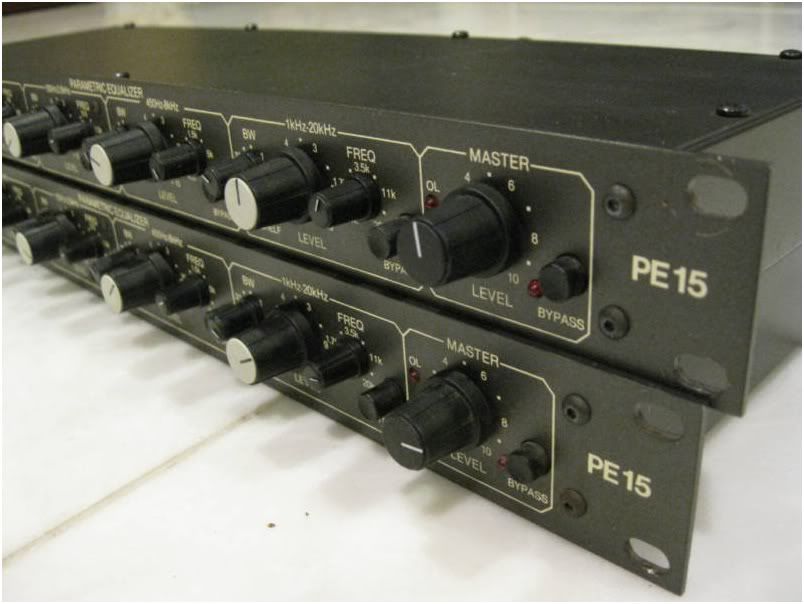
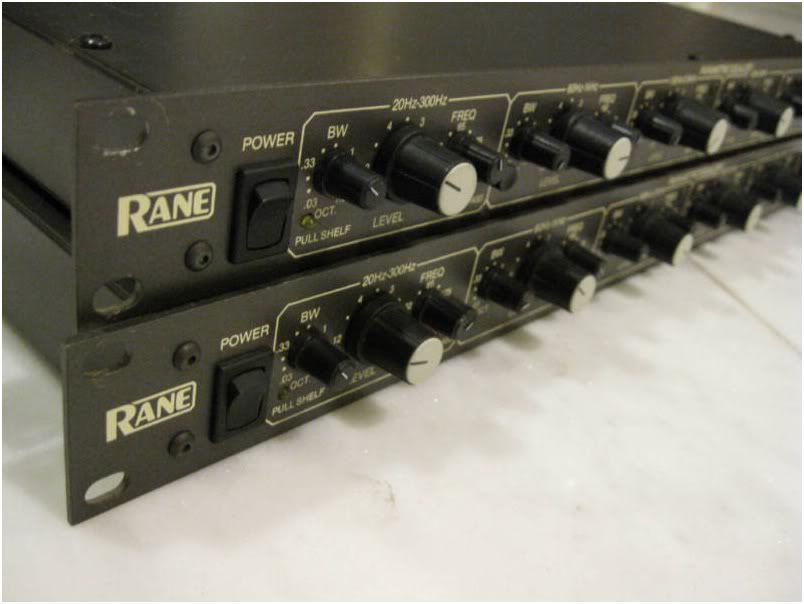
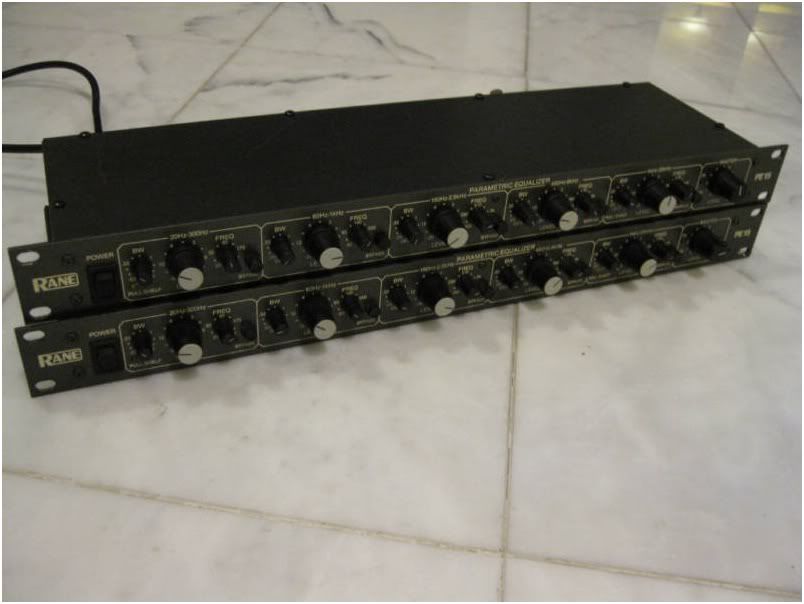
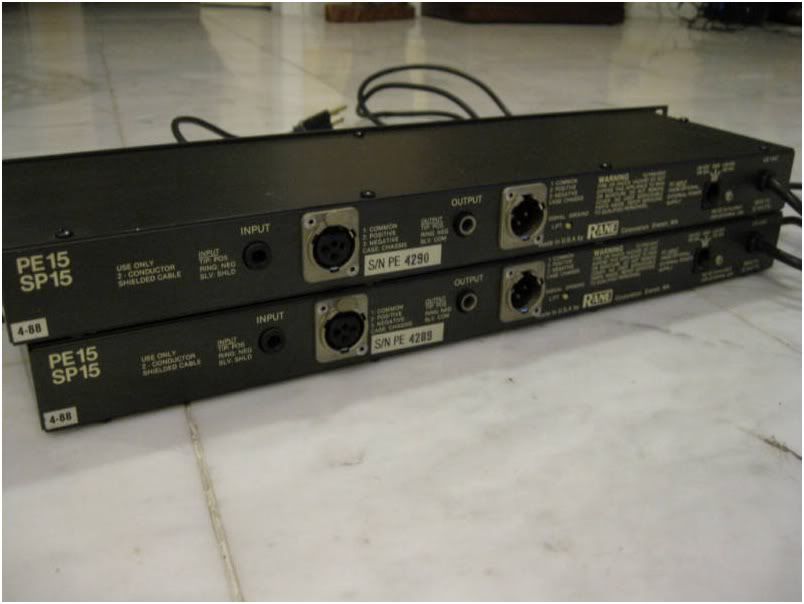
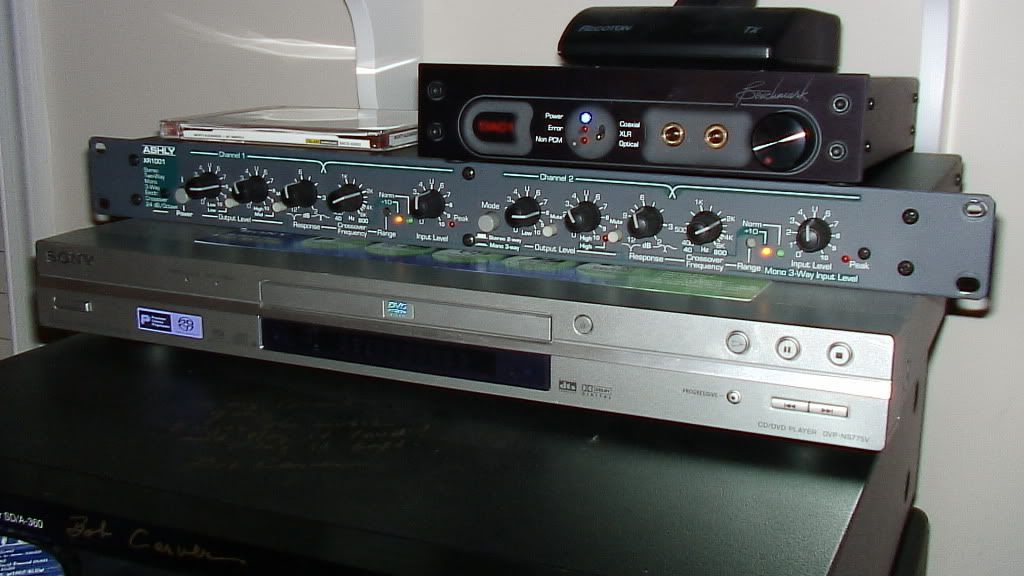
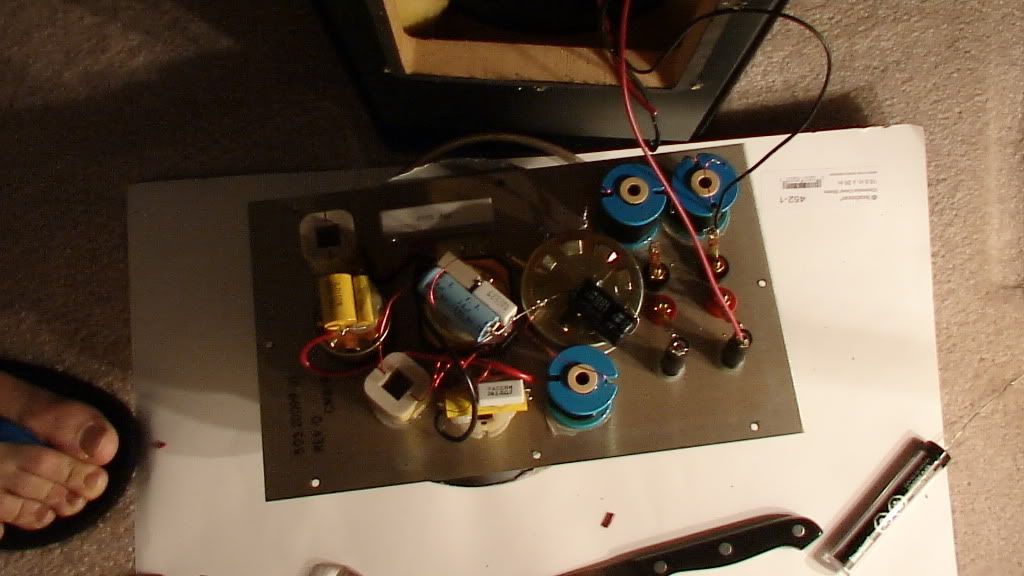
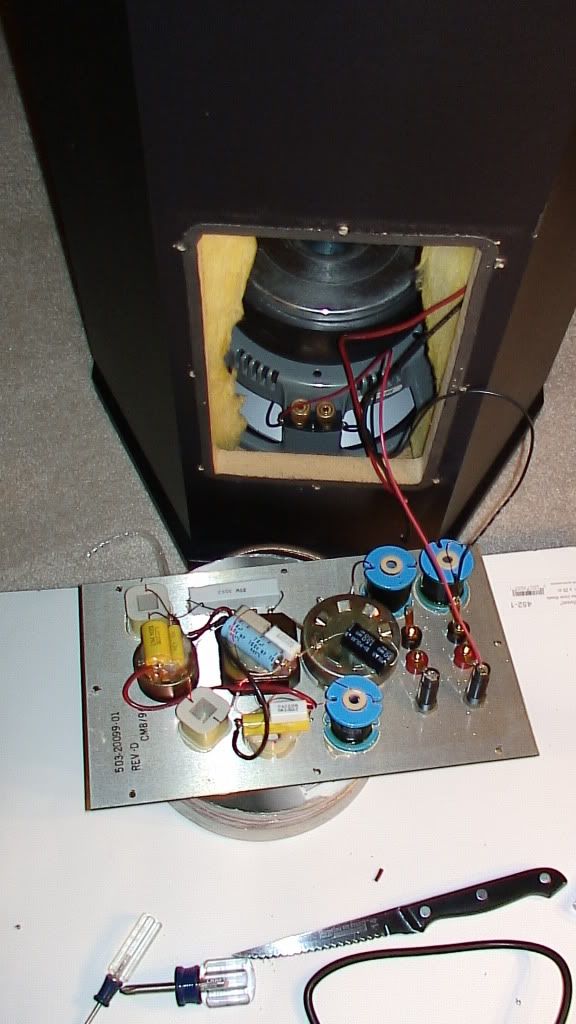
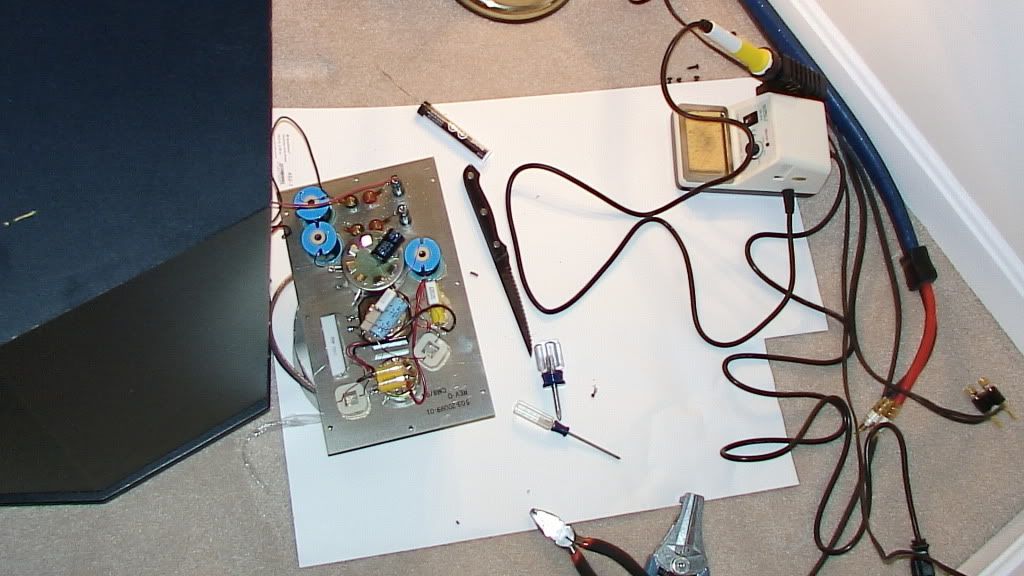
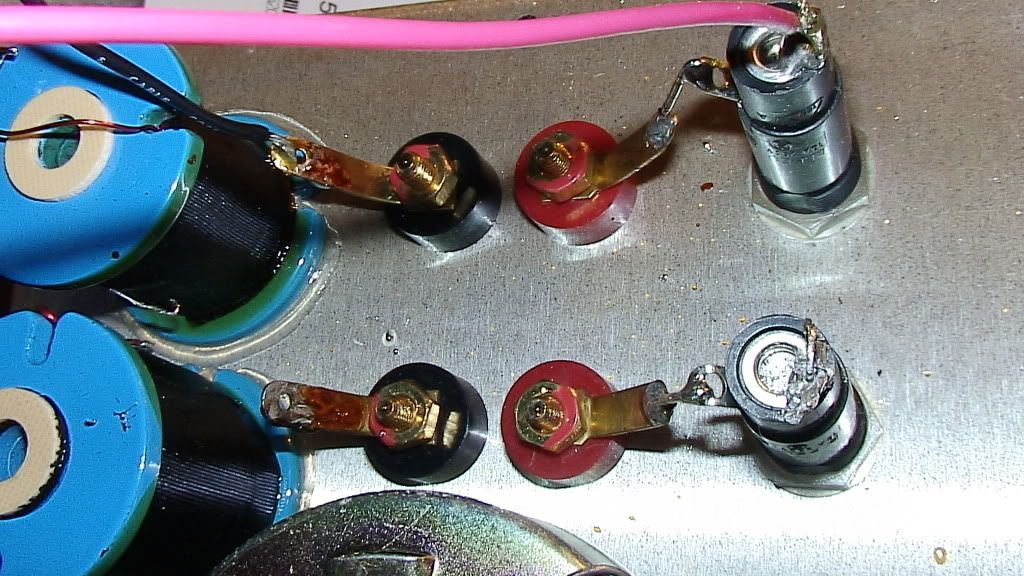
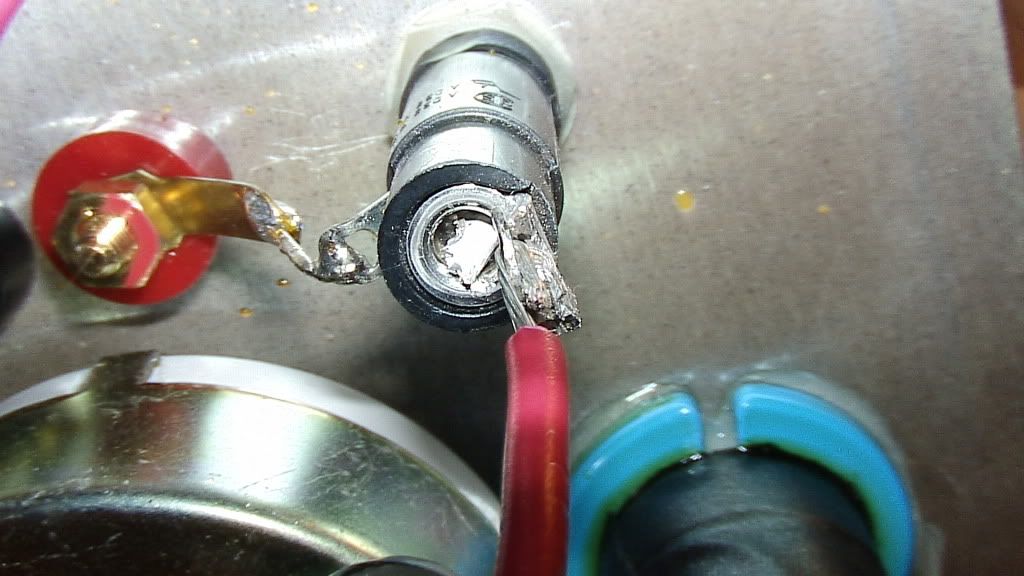
*~Gone Active~*
in Technical/Restorations
Posted
Behringer stuff is made like crap; you couldn't GIVE me a Behringer unit.